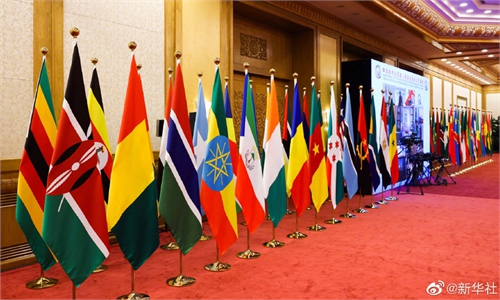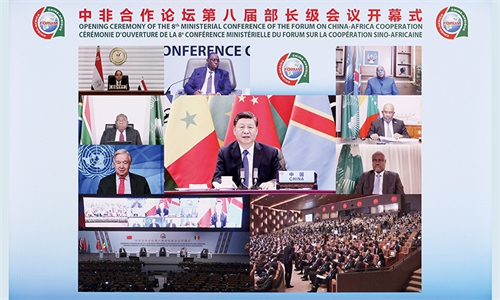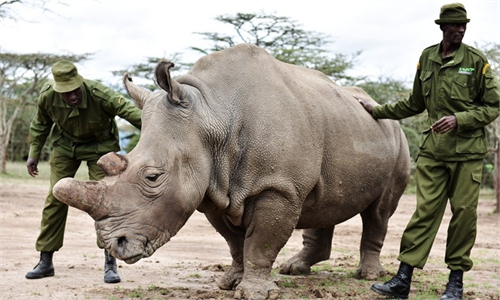China, Africa pursue green development under BRI, improving Africans’ livelihood
BRI accelerates low-carbon projects, improves livelihood

The Bamako Third Bridge (Mali) Photo: courtesy of China Energy Engineering Group Co
While China and Africa are stepping up their cooperation in traditional areas like infrastructure and agriculture, there are also new opportunities to invest in emerging sectors such as the digital and green economy, climate change and cooperation focusing on economic recovery and the fight against COVID-19.
With China determined to reach carbon neutrality by 2060, officials said in September that the country will offer strong support to both green and low-carbon energy development across developing countries and refrain from building new overseas coal power projects.
Chinese enterprises are accelerating the process of green development in Africa under the framework of the Belt and Road Initiative (BRI) centered on green energy projects, especially energy infrastructure, that will be carried out in the form of clean energy - wind, hydro and solar power.
Sustainable infrastructure
China again proposed at the opening of the 8th Ministerial Conference of the Forum on China-Africa Cooperation (FOCAC) on Monday that China-Africa cooperation should actively develop renewable energy, and continue to enhance capacity for sustainable development.
One of the latest examples is the Karuma Hydro Power Plant in Uganda which is in its final stage of construction, and will be the largest power-generating installation in the east African country when completed with a capacity of 600,000 kilowatts, the Xinhua News Agency reported.
The plant is 85 percent financed by the Export-Import Bank of China, and 15 percent financed by the Ugandan government. It is expected to generate 4 billion kilowatt-hours of electricity annually and provide over $200 million in revenue to local government, close to 1 percent of Uganda's current GDP.
Africa is rich in clean energy and natural resources, such as water, solar and wind power resources and has huge potential to develop clean energy projects, Song Hailiang, Chairman of China Energy Engineering Group Co (Energy China Group), told the Global Times on Monday at a sideline interview of the 7th Conference of Chinese and African Entrepreneurs.
The Caculo Cabaça Hydro Power Station in Angola, which is one of the largest hydro power stations under construction in Africa, is one of the new-energy power projects built by Energy China Group.
"The African Continental Free Trade Area (AfCFTA) starting this year marks the strengthened connectivity and business exchanges among African countries. The development of infrastructure, such as roads, railways, ports and airports has become a first order priority. The digital development and construction of industrial parks will create conditions for the broader transformation of the African economy," said Song.
Energy China Group now has operations in 53 countries in Africa and has 59 projects under construction.
Wang Bin, President of Power Construction Corporation of China, said that addressing climate change is a shared responsibility for companies around the world and the company is seeking investment opportunities in new energy and low-carbon projects around the world, especially in Africa.
"The development of new energy power has a great impact on traditional power systems. We are conducting research on the technology related to new power generation, and hope to apply the latest technologies to the projects under construction in Africa, and cultivate technical and managerial personnel locally," Wang said at the China-Africa entrepreneur conference on Monday.
Amadou Hott, Minister of Economy, Planning and Cooperation of Senegal, said on Monday that the China-Africa entrepreneur conference is of great significance at a time when African countries are seeking to establish a sustainable model for economic and social development, as the epidemic has had a huge impact on the African economy.
"China-Africa cooperation is resilient and has benefited Africa's economic development. The AfCFTA offers a better opportunity to further strengthen cooperation," said Hott.
By the end of 2020, the total existing direct investment of Chinese enterprises in Africa surpassed $56 billion, according to the Report on Chinese Investment in Africa released by the China-Africa Business Council in August.
Beyond investment
China in 2018 supported the establishment of an alliance focusing on the social responsibilities of Chinese enterprises in Africa, aiming to improve the livelihood of local people along with economic development.
As the scale of investment and cooperation between China and Africa continues to rise, social responsibilities become a more and more important issue to focus in the economic and business cooperation, Jiang Hui, secretary general of Alliance of Chinese Business in Africa for Social Responsibilities (ACBASR), told the Global Times on Monday during a sideline interview at the 7th Conference of Chinese and African Entrepreneurs.
ACBASR was officially launched in September in 2021 after two years of groundwork. At present, more than 1,700 Chinese enterprises that operate in Africa have participated in the alliance, covering industries of infrastructure construction, minerals, forestry, textile, telecommunication, agriculture and electronics.
"Chinese enterprises have helped accelerate the industrialization of Africa and contributed to local communities and economic development," said Jiang.
Jiang also said that the alliance will publish a report on the social responsibility track record of Chinese enterprises in Africa by the end of 2022.
The projects undertaken by Chinese enterprises have increased local jobs and helped train professional and technical personnel across a number of African countries.
Song said that in the process of executing projects in Africa, Energy China Group has promoted the localization of procurement and human resources to the greatest extent, supported and cultivated a large number of local suppliers of building materials in Angola, Nigeria, Kenya, Ethiopia and other countries, and trained a large number of engineering construction staff by setting up technical schools.
"It has laid a material and talent foundation for local economic development and industrial upgrade," said Song.
Song took the Caculo Cabaça Hydro Power Station as an example. At the peak of construction, the project will have contributed more than 8,000 jobs to the local economy and trained thousands of professional Angolan power station construction and management staff.



